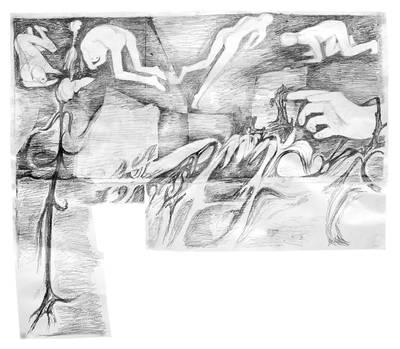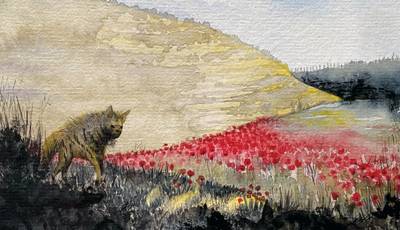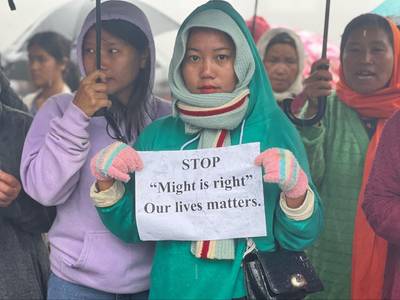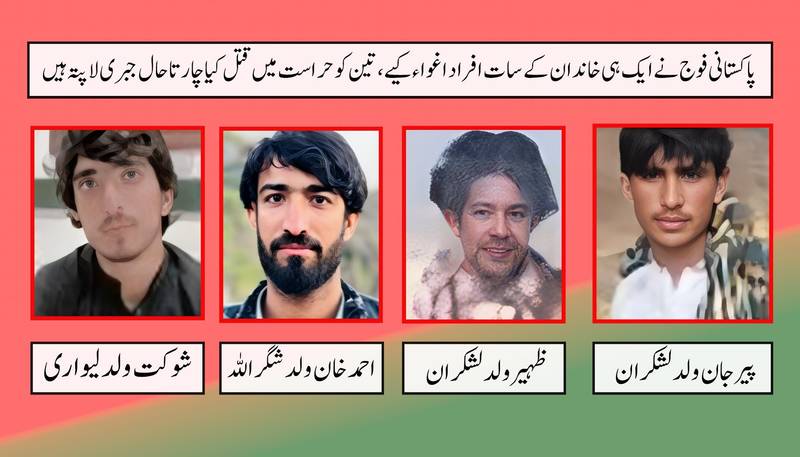

On the left side, in the first picture, Shaukat, still missing, is the brother of Nabi Dad, who’s been killed. Beside him is Ahmed, still missing. After Ahmed, it’s Zaheer; he has been released. And last is Peer Jan, the brother of Zaheer, who is still missing.
Hazaran is a Balochistan-based feature story writer, poet, and researcher. She holds an MA in English Literature from the University of Karachi and is currently pursuing an MPhil in English Literature at Iqra University. Her work primarily focuses on the experiences of Baloch people amidst war, violence, enforced disappearances, and socio-political struggles.
On November 19, 2023, a photograph spread across social media. Two Levies officers stood in a barren, mountainous expanse, next to a car reduced to twisted metal. One officer held a human leg. The other stared at a body, blown apart. More than a year later, the image refuses to fade—a human body part.
What happened? How? Where? The questions stormed my mind. Who were the people in that car? Did they see it coming—the explosion—before they were reduced to charred remains? Or were they already dead before the blast tore through?
A year passed. December 2024. I finally made the journey to Balgatar—the place where the explosion happened, where the victims had lived. A remote stretch of land, 27 scattered villages, 150 kilometers east of Turbat, in Pakistan’s southwest province Balochistan.
To begin this story and not tell how hard it was to get here would be unfair. Writing it meant going there. And going there—impossible, they said.
Every contact I reached out to hesitated. Some warned me: The families won’t talk. Others were blunt: It’s not safe. State-backed militias—death squads, as locals call them—roamed the area. Even those from Balgatar, forced to leave because of repression, made it harder. There are too many villages, they said. You won’t even know which one they lived in.
And those who did know? Their house is under scrutiny.
After months of struggle, I finally made the journey. The road stretched ahead, winding through remote landscapes—Kesaak, Kekin, Shapuk, Saami, Hironk, Karki, Tejaban, Hoshab. And then, the entrance to Balgatar.
Mountains, some green, some barren. Military. Everywhere. Small checkpoints. Huge outposts. So many, I said. The person with me laughed. Save your pages for the story, she said. Once you enter Balgatar, you’ll run out of space counting them.
She was right. Twenty-three kilometers before the first homes appeared, the mountains were already claimed—checkposts at every turn, perched high above, watching. One, two, three—I lost count. My head spun. On the bigger outposts, statues of soldiers stood like silent sentinels. For a second, they looked real.
Then, the network vanished. No signal. No internet. The Zong network appears at 5:30 in the evening. By 9:30 in the morning, it’s gone. Some days, it doesn’t come at all.
When the road finally opened to life, there were small, scattered huts—seven, ten in a cluster, sometimes fewer, sometimes more. All beneath the watchful gaze of the checkposts above. Even here, the military loomed. Shops had turned into checkpoints. Every step forward felt like stepping into a place already seen, already known, already controlled.
The first sight—huts, not even made of mud. Just dead palm leaves and wooden frames, fragile against the wind. The bathrooms stood apart, roofless, covered only by branches. No electricity. Some homes had solar panels, just enough to power a dim bulb.
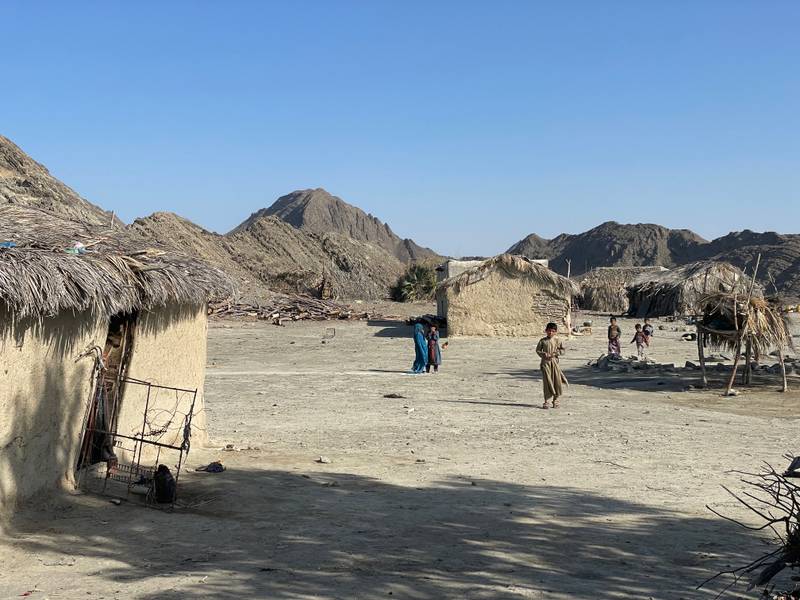

This is Balgatar, where the victim families live.
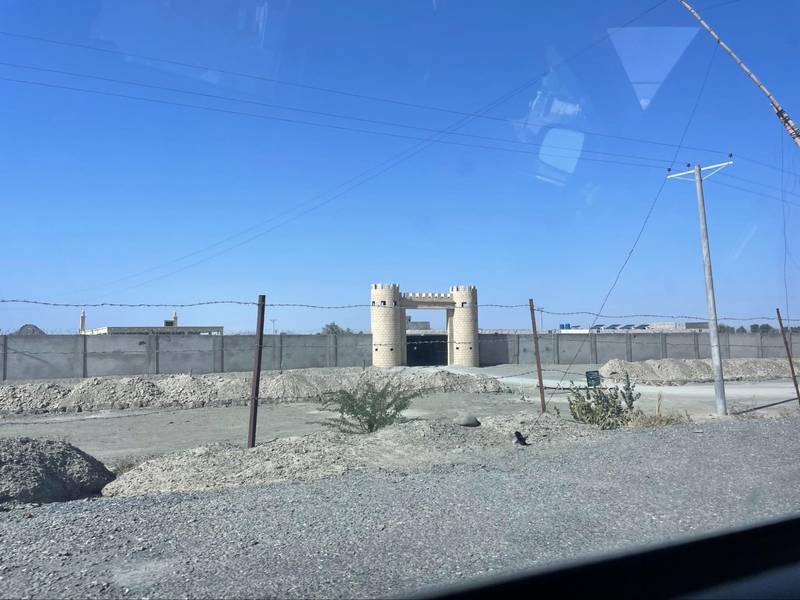

Military camp, Balgatar.
Women walked from a distant well, balancing heavy water containers. It was winter now. I tried to imagine the summer heat, what it meant to fetch water in those months.
Nearby, some women sat sewing. Old men tended to their goats. Hens pecked at the ground. Life, simple and unshaken.
I asked if this was the right place. They nodded.
Seven or eight huts, scattered in the dust.
You sit inside their hut—humble, warm in its welcome. A bowl of water is placed before you, metal twisted and worn with time. You take a sip—more salt than water. We don’t get clean water, they say, almost apologetic. You nod, smile, and drink anyway.
Then, a cup of black Sulemani tea.
And silence.
You hesitate to speak. They hesitate, too.
To them, you are unknown—perhaps one of them, perhaps from the authorities. You cannot explain what a writer is. Even if you could, what would it change for them?
Then, a schoolteacher arrives. Someone they trust. He introduces you, reassures them. The silence softens. The hesitation lingers.
It never fully leaves.
There is a compounder nurse in the area. That’s what they call him. But there is no hospital, no real medical care. Small illnesses turn fatal. People die—not from disease, but from not being diagnosed in time.
A primary school stands here. For college, students travel all the way to Hoshab—far, too far.
Teachers are given one instruction: Bring students to the August 14 and March 23 celebrations. Beyond that, the forces don’t interfere. But when they are attacked by Baloch armed groups, they return—to the villages, to the people.
Then come the raids. And more raids.
August 22, 2023.
Seven young men. One family. Taken.
It happened in different places, at different times, but always the same way—by FC personnel and local militia (death squads).
Nabi Dad and Shaukath Liwari, brothers. Sons of Liwari Jan Mohammad. Nabi Dad, 26, a fisherman, had just returned from the sea. Shaukath, 15, a school student in Turbat, was on his way to Center English Academy. He never arrived.
Adil and Shah Jan, brothers. Sons of Assa. Adil, 19, a pre-medical student at Hoshab Degree College. Shah Jan, 16, a seventh grader in Turbat. After school, he worked at a shop. In the evenings, he studied English at an academy. He worked to pay his own fees.
Zaheer, 21, a Zamyaad driver. He had malaria. He had been in Turbat for treatment.
Peerjan, his younger brother, 16. A shopkeeper in Balgatar. That day, he wasn’t at the shop. He was driving the Zamyaad in his brother’s place.
Ahmed, a university student. Arid University, Rawalpindi. That day, he was home, visiting Turbat.
Seven cousins. From the same villages. From the same family.
One by one, they were taken.
From the market. From the road. From the hospital. From their home.
All on the same day.
(In peripheral areas, children start school much later than usual.)
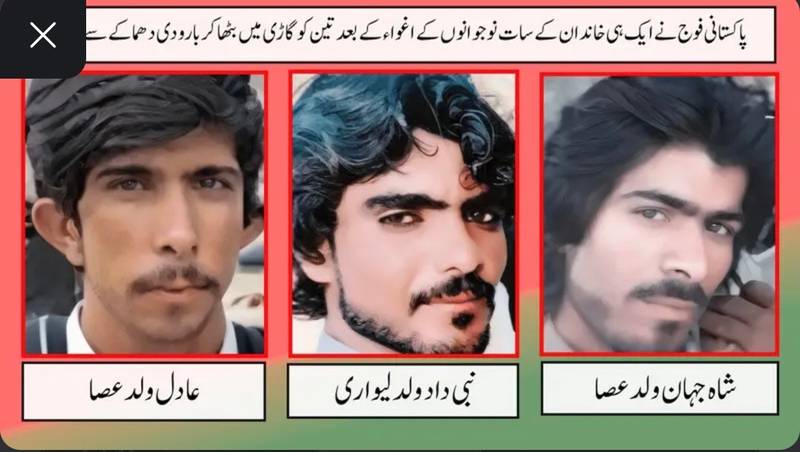

These are victims of car blast. On left is Adil. Middle is Nabi Dad, and right side is Shah Jan. Adil and Shah Jan brothers.
November 19, 2023
Early morning, across the barren, mountainous stretch of Balgatar Daak, a shepherd passed through the valley. In the distance, he saw a car—wrecked, burned. At first, it looked like an accident. But as he moved closer, he noticed the charred remains of bodies inside- a blast.
He ran back to his village, breathless, and told the others. When they arrived, the truth was unmistakable: the car had been bombed. Three bodies lay inside. One was recognizable—Adil. The others were burned beyond recognition.
It was just before 9 a.m. The network was still available. Someone called Assa’s house.
“Your people have been killed.”
The small hut filled with screams. Assa’s sons—Adil and Shah Jan—were gone.
Nearby, Lashkaran, father of Zaheer and Peer Jan, was tending to his farm when he heard the wailing. A chorus of grief rising from Assa’s house. His first thought: the forces have raided again. Had they abducted Assa? Killed him?
In that moment, no one knew the full picture. The call had been brief. But the fear in their hearts was absolute—all seven had been killed.
All seven families rushed to Daak, but the villages were scattered, each far from the other. By the time they arrived, it was too late.
They were told the Levies officers had taken the bodies to Hoshab Hospital, a 40-minute drive away.
Desperate, the families hurried to the Levies Naib (deputy officer)—these were their sons, their blood.
At the hospital, reality struck.
Three bodies. Burned. Bombed**.**
Two brothers, Shah Jan and Adil. Their cousin, Nabi Dad.
Killing
Shah Jan was in the front seat. Beneath his feet—an IED bomb.
Behind him, Nabi Dad and Adil.
When the bodies were found, the signs were clear.
Adil—two bullet wounds. One in the back. One in the chest. Burn marks on his skin. Torture.
Nabi Dad—two bullets in the chest. Shah Jan—his eyes were taken out. No bullet wounds.
The car—damaged, its front torn apart.
Assa, standing over the remains of his sons, his voice hollow.
“They are not human. They are wolves, and we are goats.”
Collective Punishment;
Like much of Balochistan, Balgatar is controlled by state-backed death squads.
They roam freely—trafficking drugs, firing at will, harassing, kidnapping.
One day, Baloch insurgents planted an IED bomb targeting a local death squad.
The response came swiftly.
Assa’s brother had long left home to join the Baloch pro-independence groups.
That was enough.
Death squads, alongside FC personnel, stormed in.
They took seven. They killed three—the same way their own men had died.
Lashkaran, father of Zaheer and Peer Jan, his voice bitter:
“If Nabi Dad hadn’t been taken from home, in front of our eyes, we would never have known how our children disappeared. We would have had no proof.”
Assa, staring at what’s left of his home, his eyes bloodshot and filled with tears that streamed down his face:
“Your competitor is in the mountains. Go fight them. But you can’t. So you come back and take out your frustration on common people. My family is finished.”
Once a Zamyaad driver, he is now sick.
His home survives on the labor of his two daughters, stitching embroidery to keep the family alive.
(His pro-independence brother was later killed by forces in a clash.)
Zaheer’s Return
Fourteen months. That’s how long Zaheer was gone.
Before that, the families had given up hope. They thought all seven were dead, their bodies never to be found.
The day Zaheer was taken by Frontier Corps and death squads, he was in a hospital. A state-backed militia member slapped him so hard that his nose never stopped bleeding.
Dark rooms. No light. No way to see each other. But they could hear. They could hear the voices. Sitting in one position for hours. No tapping feet. No stretching. No shifting.
If they moved, they were beaten. Zaheer’s back still aches. His nose, still damaged. When he returned, his mind was not his own. His father sold goats to take him to Karachi for treatment.
Three months in.
A name was called. Then another. Then another.
Adil.
Shah Jan.
Nabi Dad.
They were told they were being released.
Zaheer and Ahmed shared a cell.
Zaheer thought, How lucky they are. Three months and they are free.
Then Ahmed said, Something is wrong.
“We were taken together. Why are they being released first?”
From a nearby cell, Nabi Dad’s voice:
“Thank God, a thousand times, we are being released.”
Then, a sound.
Peerjan passing Nabi Dad his slippers.
Nabi Dad’s own slippers were missing.
Fourteen months later.
Zaheer stepped outside. Blinded by the light.
For days, everything was blurred.
On the third day, he asked his mother:
“Everyone has come to see me. But not Adil’s and Shahjan’s mother.”
She didn’t answer.
“Is Adil in the city? Is Nabi Dad at sea?”
And that was the moment they told him.
How they were killed.
Zaheer’s scream shook the house.
For three hours, he stood at the door, unable to move.
Before his abduction, Zaheer had 90,000 rupees of Zamyaad owner, a mobile phone, and a bike.
An FC soldier took 30,000.
At the time of his release, the same soldier whispered:
“Don’t mention the other 30,000 to the officer.”
The officer asked:
“Why were you arrested?”
“I don’t know.”
“Some people made you disappear over personal matters.”
“What did you have before arrest?”
“a mobile, 60k and a bike.”
Mobile was handover to him.
“Call your father.”
“He doesn’t have a phone.”
A borrowed phone. No signal. The network was dead.
They put him in a vehicle. Dropped him on an empty road across Balgatar.
Zaheer said he never asked about the money or his bike, fearing it might lead to his arrest again. The risk was too great. He had seen his brother only once, through the slit of his blindfold, when they were taking him to the clinic. He was frail, weak—barely recognizable.
The Mothers’ Grief
The bodies lay before them.
Shah Jan’s mother screamed, her voice piercing the silence.
“I wish I were not alive, like Nabi Dad’s mother.”
“I should not have to witness this sight.”
“A mother must never see her sons die.”
“Not like this. Not when you can’t even recognize them.”
Sahib Khatoon—mother of Adil and Shah Jan. She looks around 48, but grief has aged her beyond years. The weight of loss has settled into her face, carving swollen layers beneath her eyes, endless nights of crying. Two sons, taken. Two sons, blown apart. In the same moment, in the same breath."
Her hands are dust-covered, her dress worn and weary, clinging to a body drained of life. A torn chadar rests on her head, Frayed and worn, that it can no longer hold back the strands of unkempt hair pushing through. An amulet-thread tied around Sahib Khatoon’s forehead—given by a mullah for sabr. Patience.
But patience will never come.
She does not speak of how her sons were killed. She does not speak at all.
She sits among women, silent, distant. Then that school teacher turns to you and says, ‘She is the mother of Adil and Shah Jan’. And in that moment, regret crashes over you. You came to document, to write, to make their suffering known. But what is the worth of words in front of a mother who has lost not just her children, but even her language?
She cries. The room follows. And you, sitting there, feel the tears not just in your eyes, but into your conscience. You wonder—what is the purpose of documenting this, when nothing can change their reality? When a person is disappeared, you can offer their family the fragile hope of return. But when they are killed—blown apart—what do you give them? What can you possibly give them?
Zaheer’s mother still waits for Peerjan.
Nabi Dad’s sister waits for Shaukath.
Ahmed’s mother waits for Ahmed.
But Sahib Khatoon has no hope left.
The families have chosen silence.
No outbursts. No words.
Only tears.
Sahib Khatoon, consumed by grief, does not speak. The other women remain silent—not just in sorrow, but in fear. They think that if they speak, the local militia may not spare their remaining children.
Lashkaran spoke at last:
“When all seven were taken, we went to the local militia.”
“We begged for mercy. We pleaded for our sons.”
“We placed our turbans at their feet. The women laid down their chadars.”
“We thought they would spare them.”
“We thought they could not be this cruel.”
“But they are worse than we ever imagined.”
Ahmed Baloch was released by Pakistani Forces on the first week of June 2025, few months after this article was written.


